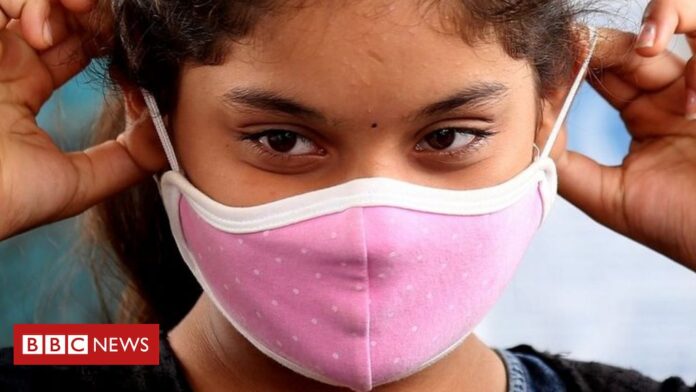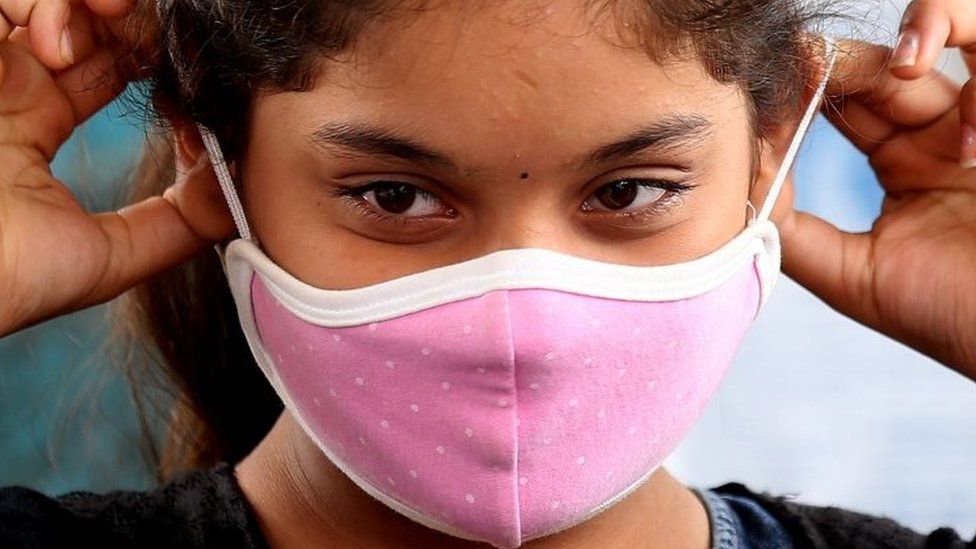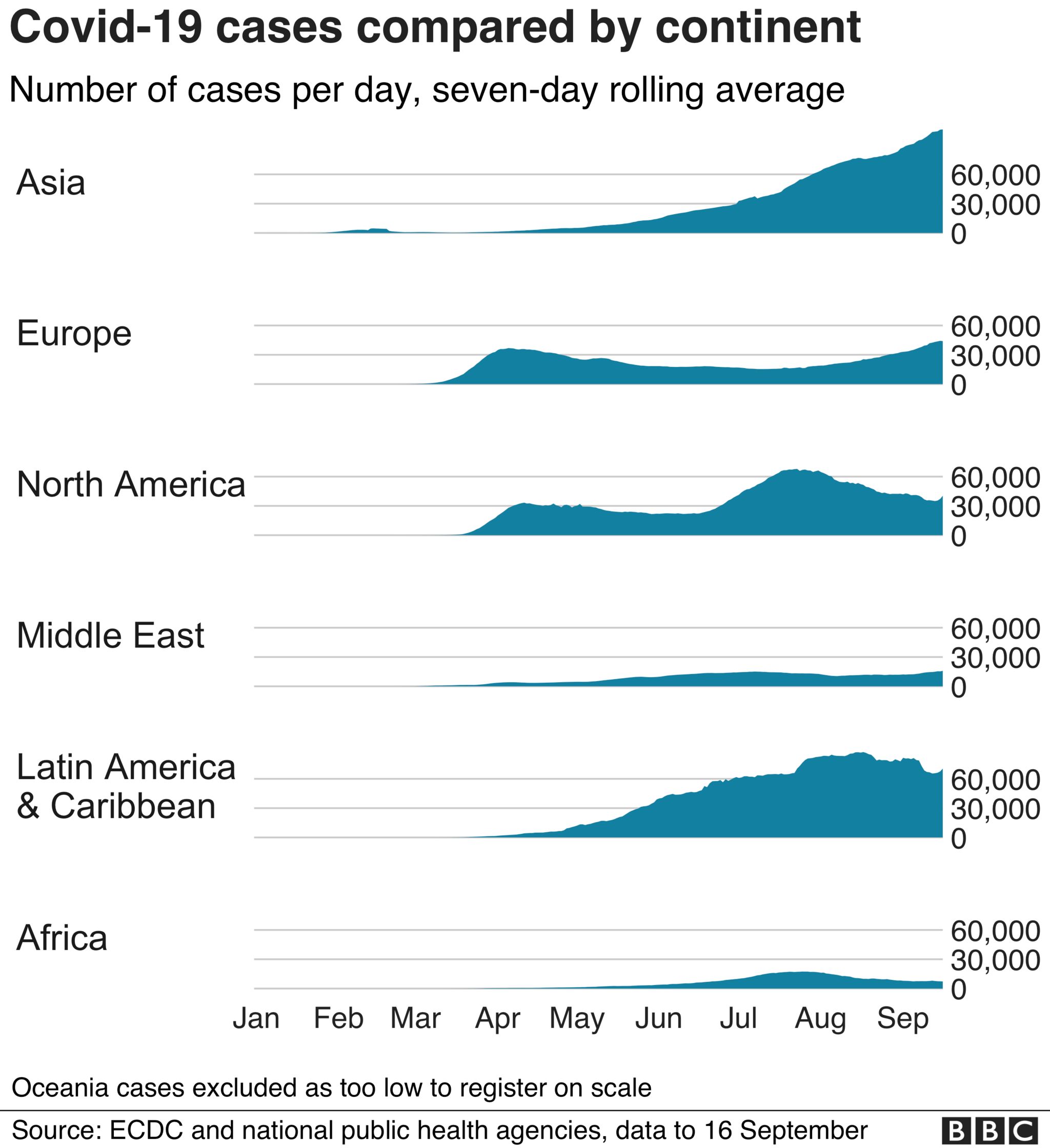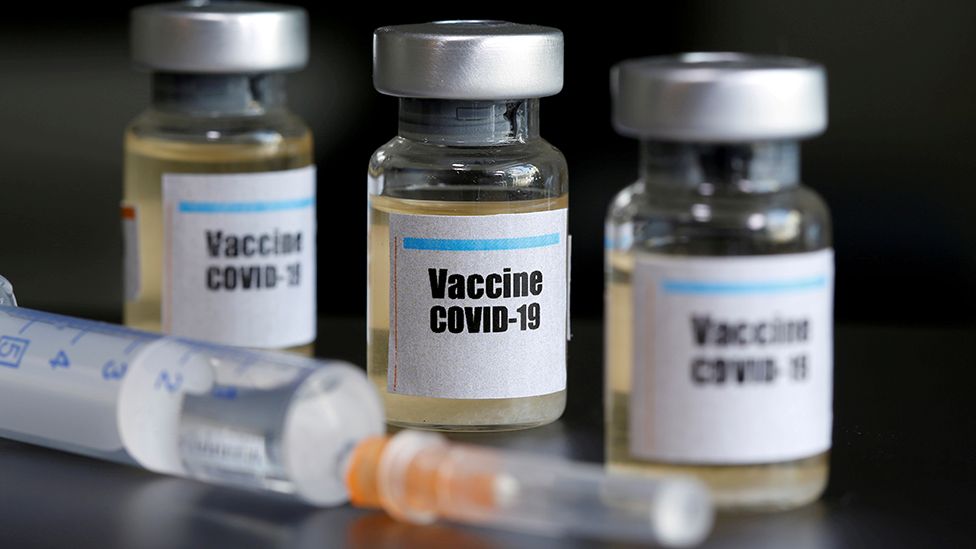

The number of confirmed coronavirus cases across the globe has surpassed 30 million, according to figures by America’s Johns Hopkins University.
More than 940,000 have died with Covid-19 since the outbreak began in China late last year.
The US, India and Brazil have the most confirmed cases, but there is a renewed spike in infections across Europe.
Many northern hemisphere countries are now bracing for a second wave of the pandemic as winter approaches.
In the UK, the government is considering taking further England-wide measures including a short period of restrictions to try to slow a second surge of infections.
Outside Europe, Israel brings in a second nationwide lockdown later on Friday – the first nation to do so.
Africa has recorded more than a million confirmed cases, although the true extent of the pandemic in the continent is not known. Testing rates are reported to be low, which could distort official figures.
What is happening in key countries?
A team of infectious disease experts at Johns Hopkins University, in the US city of Baltimore, have been documenting the global spread of Covid-19 on its tracking website.
According to their data, the US remains by far the worst-hit country in terms of sheer numbers, with more than 6.6 million confirmed infections, and over 197,000 deaths.
The number of new daily infections has been dropping, though, after a spike in July.
Earlier this week, President Donald Trump denied downplaying the seriousness of Covid-19, despite admitting in a recorded interview to having done that.
In India, the number of known infections climbed above five million this week – the second-highest caseload in the world.
When comparing figures from different countries it is important to bear in mind factors such as population size and density. For instance, India has a population of 1.3bn people.
However, the virus appears to be spreading much faster in India than any other country, with daily cases topping 90,000 in recent days. More than 80,000 people have died, amid reports of shortages of intensive care beds and oxygen supplies.
Brazil has had more than 4.4 million confirmed cases, with more than 134,000 fatalities – the second-highest death toll after the US.
President Jair Bolsonaro has come under criticism for downplaying coronavirus, particularly after attending an anti-lockdown rally. The right-wing leader – who had been calling the virus a “little flu” – himself tested positive in July.
Argentina and Mexico have also been hit hard by the outbreak in Latin America.


Argentina on Thursday reported nearly 13,000 more cases over a 24-hour period, pushing the country’s overall total above 600,000.
Meanwhile, Mexico confirmed more than 3,000 daily infections, bringing the caseload to more than 680,000.
At the same time, deaths per 100,000 people vary significantly from country to country, with San Marino, Peru and Belgium having the highest rates, and India one of the lowest.
The new coronavirus first came to light after China reported a cluster of infections in the city of Wuhan in December 2019. It has come under fire for being slow to acknowledge the outbreak, allowing gatherings to take place even as concerns grew and punishing doctors for warning others.
It has since been praised for effectively slowing the spread of the virus, after imposing a massive lockdown and increasing hospital capacity. It has so far confirmed 90,000 cases and 4,700 deaths, according to Johns Hopkins, although there have been concerns of underreporting.
What is the situation in Europe?
Surging coronavirus figures on the continent should serve as “a wake-up call”, the World Health Organization’s regional director has said.
Speaking in Copenhagen on Thursday, Hans Kluge said in the past two weeks the number of new cases had doubled in more than half of European member states.
He said that 300,000 new infections were reported across Europe last week alone and weekly cases had exceeded those reported during the first peak in March.
According to the WHO, there have been five million confirmed cases and more than 228,000 fatalities across Europe since the pandemic began.
Is there light at the end of the tunnel?
A number of countries and companies are piling resources into finding a vaccine that is safe and effective.
President Trump has recently said a vaccine might be available before the 3 November presidential elections – despite warnings from a number of health experts that this is unrealistic.

Russia in August licensed a vaccine for local use – the first country to do so. Russian scientists later published the first report on the vaccine, saying early tests showed signs of an immune response.
But experts warned that the trials were too small to prove effectiveness and safety.
No vaccine has yet completed clinical trials, leading some scientists to fear politics rather than health and safety is driving the push for the possible cure.
There are also concerns that the race to get a vaccine will be won by the richest countries, at the expense of the most vulnerable.
At the same time, more than 150 different drugs are being researched to identify treatments for people with severe Covid-19.
Of all the drugs being trialled, only steroids have been proven to save lives and the discovery has been a significant breakthrough.
The UK’s Recovery trial showed the steroid dexamethasone cut the risk of death by a third for patients on ventilators and by a fifth for those on oxygen.
And further data suggests another steroid, hydrocortisone, is equally effective too.
Source: BBC




